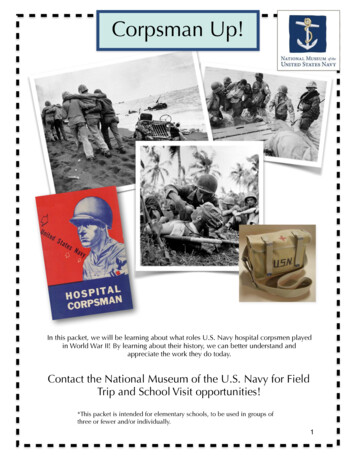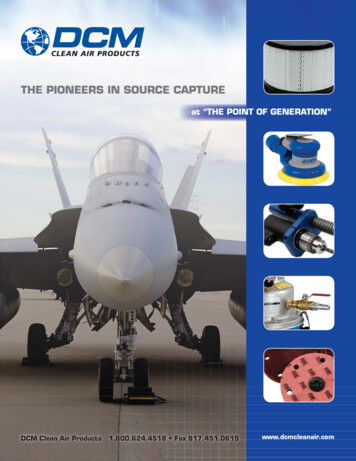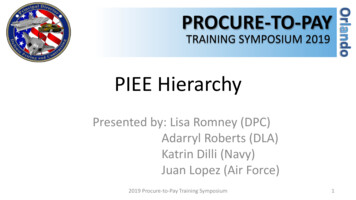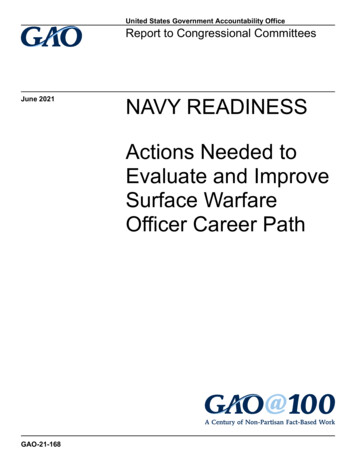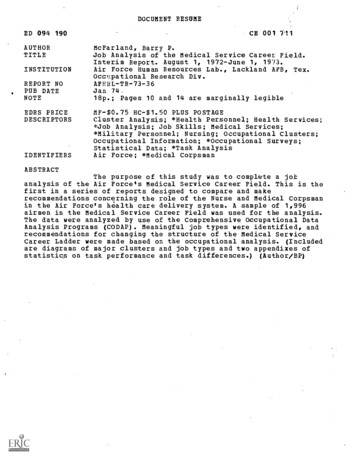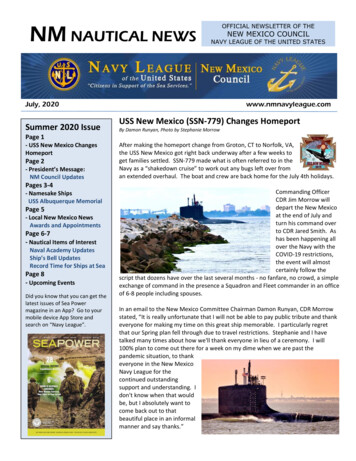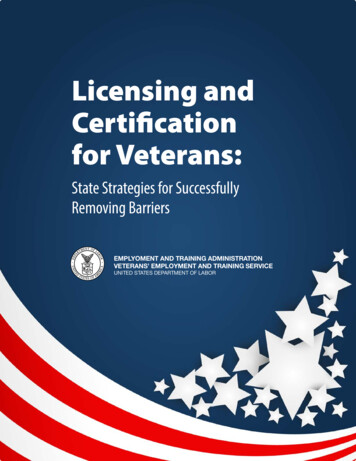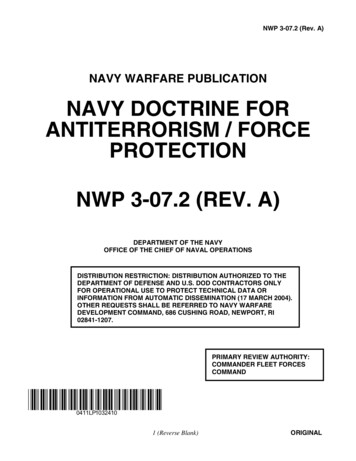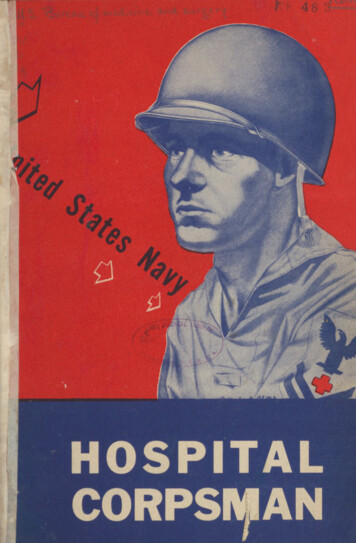
Transcription
HOSPITALCORPSMAN
“Health is necessary in warand cannot be replaced byanything else.Napoleon.The primary mission of the Medical Department of theUnited States Navy, of which the Hospital Corps is a part, is sTo keep as many men at as many gunsas many days as possibleAs a member of the Hospital Corps you can contributedirectly to the job of keeping our guns firing. There is nobetter way to serve your country and your fellow man. Ifyou can qualify for admission to the Hospital Corps, theNavy will train you for your duties.Prepared for the Occupational information and Guidance Service,VocationalDivision,U.S.OFFICEOF EDUCATION,FederalSecurity Agency, by the Hospital Corps Section, Bureau ofMedicine and Surgery, UNITED STATES NAVY.December 1, 1943
INTRODUCTIONFrom its very beginning as an established Corps in 1898 the HospitalCorps of the United States Navy has been devoted to humanitarianservice. It has administered first aid and nursing care to the sick andinjured of the Navy and Marine Corps during three of the Nation’s wars,and through the many years of intervening peace.For more than a century prior to its organization by act of Congress*the pioneers of the Hospital Corps—the Hospital Mates, the HospitalStewards, the Surgeon’s Stewards, the Apothecaries, the Nurses and theBay men—served faithfully and energetically in the Medical Departmentof the Navy.On numerous occasions of the past members of the Hospital Corps havebeen assigned to civilian areas for first-aid and relief work in times ofdisaster. In 1908, Hospital Corpsmen of the American Fleet at anchorin Alexandria, Egypt, were speedily dispatched to Messina, Sicily, whenword of Mount Aetna’s eruption reached the Commander in Chief. In1918, every naval hospital in the United States loaned Hospital Corpsmen to neighboring areas to help care for the civilian sick in the greatinfluenza pandemic. In 1923 the Asiatic Fleet landed Hospital Corpsmenat Yokohama to administer relief following the earthquake which wreckedthe city. From 1915 to 1934 hundreds of Hospital Corpsmen wereassigned to duty in the Republics of Haiti and Santo Domingo, tominister to native populations during the Navy’s health crusade on theIsland of Hispaniola.Many young people are now debating within themselves regarding a placewhere they can best serve their country in an hour of need. It is hopedthat this brochure of information relative to the work and mission of theHospital Corps will help to guide them to an avenue of service.Rear Admiral (MC)Surgeon General, United States Navy
FOREWORDThe Hospital Corps of the United States Navy offers to young men op-portunitiestoassist in returning men from the destruction lines to theproduction lines. At the same time these youngmenas members of theHospital Corps are obtaining skills in useful peacetime careers, in suchfields as dental technologist, first-aid man, food inspector, medical tech-nologist, nurse, physiotherapist, sanitarian, and X-ray technologist.The fields mentioned are only a few among many related peacetime jobs.Types of Navy specialized training courses open to qualified men areaviation medicine, commissary work, deep-sea diving, laboratory tech-nique, medical field service, and property andaccounts.Young menwill be able to apply in their Navy courses for promotion or for specializedwork information obtained from such school subjects as chemistry, firstaid, physiology, hygiene, and bookkeeping.The young men of this Nation who serve in the Hospital Corps of theU. S. Navy will be preparing for post-war opportunities while performingduties which help their Navy comrades when they need help most.9-V.U. S. COMMISSIONER OF EDUCATION
CONTENTSPageIntroductioniForewordiiLadder of AdvancementivA Spot for You1Qualifications for Duty3Foundation Courses4Hospital Corps SchoolsSField Hospitals8Period of Service9Promotions9Ratings, Pay, and Allowances10 11Opportunities12Officers of the Hospital Corps12Other Commissions12Where Hospital Corpsmen Serve14Duties —Officers17Duties—Enlisted18First Aiders20Citations22Honor Roll24Log of the Hospital Corps25
coRPsiirieMENTTRAINING DutiesLIEUTENANT EUTENANTAdministrativeDutiesJunior GradeENSIGNCHIEF PHARMACISTBASEPAYCommissionedPHARMACISTWarrant Officer 138SkilledProfessionalDutiesCHIEF PHARMACIST’S MATEPermanent Appointment 126AdministrativeTraining andExperienceCHIEF PHARMACIST’S MATEActing Appointment 114PHARMACIST’S MATESpecializedDutiesFirst Class 96ESTABLISHEDGRADES andPHARMACIST’S MATERATINGSSecond Class 71PHARMACIST’S MATEThird ClassGeneral UtilityFirst AidSpecializedTechnicalTraining 66NursingHOSPITAL APPRENTICEFirst Class 54HOSPITAL APPRENTICEHospitalTrainingSecond ClassHospital CERSOFTHIS CORPSARE SELECTEDFROMQUALIFIED ENLISTEDME
The HOSPITAL CORPSof the UNITED STATES NAVYA SPOT FOR YOUIf you are between the ages off 17 and 50, if you meetminimumphysicalrequirementsfor activenavalservice, if you have aptitude for care off the sick andinjured, or experience in any of the auxiliary fields ofmedicine, there is a spot in the Hospital Corps for you.Age 17If you are 17 and have sufficient education to learn and a particulardesire or liking for Hospital Corps duties, you can enlist as a HospitalApprentice Second Class in Class V-6, U. S. Naval Reserve. Withexperience equivalent to a standard Red Cross first-aid course you mayenlist as a Hospital Apprentice First Class. Consent of parents orguardian is required for 17-year-old enlistments.Age 18 to 37If you are in this age group you can, during induction, request assignment to the Navy quota. If request is approved, you will go to a NavalTraining Station, where you may ask for assignment in the HospitalCorps.1
Navy inductees who do not have a professional background, but whohave the desire and aptitude for such duty may request assignment toa Hospital Corps School. Selected applicants are ordered to a basiccourse of instruction. Graduates of this course are eligible for furthertraining and for regular advancement in the Hospital Corps.If qualified professionally by civilian training or experience, you may beeligible for a Petty Officer rating of the Hospital Corps. In this caseyou must present acceptable evidence of education, training, registration, or experience in one of the related fields of medical science.Accepted applicants are, on completion of the required period of recruittraining, advanced to a Hospital Corps rating appropriate to their professional background. Such rated men are assigned to a Naval Hospitalfor orientation, on completion of which training they may, if in allrespects qualified, be further advanced to the rating of Pharmacist’sMate Second Class.Age 38 to 50If you are between the ages of 38 and 50, and have the requisite trainingand experience, you may apply for enlistment as a Petty Officer of theHospital Corps in Class Y-6, U. S. Naval Reserve. Men who havehad experience in minor surgery equivalent to advanced Red Crossfirst-aid courses, experienced orderlies in civilian hospitals, and menrecently qualified in Medical Department technical specialties with ashort period of practical experience may qualify as Pharmacist’s MatesThird Class. Professional men may qualify up to the rating of Pharmacist’s Mate Second Class. Men with satisfactory records of prior military or naval service may qualify up to the rating of Chief Pharmacist’sMate (acting appointment).The Hospital Corpsman performs every conceivable task in connectionwith the care of the sick and injured. Hospital Corps duties begin withthe practical nursing care of the sick, and range through the fields offirst aid, clinical laboratory. X-ray, physical therapy, pharmacy, fieldsanitation, embalming, commissary and messing, dental and surgicalassisting and mechanical dentistry, care and accounting of medicalproperty and stores, and all Medical Department clerical work.#2
QUALIFICATIONS FOR DUTY IN THEHOSPITAL CORPSThe Hospital Corpsfields of medicine.any of the followingment for the dutiesneeds men with varied backgrounds in the auxiliaryIf you have had general training or experience infields, your background may be suitable for developof the Hospital Corps:Any auxiliary medical HeldOrthopedic appliancesChiropracticOsteopathyClinical laboratory techniquePharmacyDental techniquesPhysical therapyEmbalmingPodiatryFirst aidPractitioner (healing arts)Hospital Services (general)Procurement, dental or medicalMedical technologyNursing, general or specialSanitation and public healthX-RayOptometry and opticsPharmacist’s Mates with theirprecious cargo of blood plasma.3
FOUNDATION COURSESFoundation courses are not required for entrance into the Hospital Corps.The only prerequisites are aptitude and desire for service in connectionwith the care of the sick and the injured.However, several helpful courses are available to most high-school andcollege students seeking a general education. Students planning to gainadmission to the Hospital Corps would do well to incorporate some ofthese with their regular course:BIOLOGYCHEMISTRYCOMMERCEFIRST AIDGENERAL SCIENCEMATHEMATICSPHYSICSPHYSIOLOGYTYPINGThe sciences will be especially helpful by way of introduction to thebasic studies of the Hospital Corps in case of Hospital Apprentices whohave not had the advantages afforded by a course of instruction in aHospital Corps School.Background courses in commerce, mathematics, and typing will help toprepare a student who may desire to specialize in the Hospital Corpsin medical clerical work or accounting, commissary, property, and storeroom activities.First aid is one of the basic professional activities of the Hospital Corps.Standard and advanced courses have been made available in all partsof the United States by the American Red Cross and the Office of CivilianDefense. Many high schools are making "first aid” a part of theircurricular or extracurricular activities, with the addition of first-aidcourses or the organization of volunteer first-aid detachments.
HOSPITAL CORPS SCHOOLSThe Medical Department of the Navy places great emphasis on bothbasic and advanced training for members of the Hospital Corps. Allmajor Medical Department activities within the continental limits of theUnited States, and many beyond the seas, are engaged in the training ofmedical technicians.Hospital Corps Schools for hasic training are located in connection withthe U. S. Naval Hospitals at Bainbridge, Md.; Farragut, Idaho; GreatLakes, 111.; Portsmouth, Ya.; and San Diego, Calif.Medical Field Service Schools are maintained at the Fleet Marine Forcetraining centers at Camp Lejeune, New River, N. C., and Camp Elliott,San Diego, Calif. Schools for technicians in aviation medicine are locatedat Naval Air Centers throughout the country.Orientation schools for newly enlisted or inducted Hospital Corpsmen ofthe U. S. Naval Reserve are conducted at all Naval Hospitals within thecontinental United States.The National Naval Medical Center, Bethesda, Md., which embracesthe U. S. Naval Medical School, the U. S. Naval Dental School, the U. S.Naval Medical Research Institute, the Hospital Corps School for Waves,and the Washington Naval Hospital, is the Navy’s center for medicalresearch and instruction. The cornerstone was laid by PresidentRoosevelt on Armistice Day, 1940. In less than 2 years the Center wasin full operation. Advanced courses of instruction in many professionalspecialties are given at Bethesda, for both officer and enlisted personnelof the Medical Department.U. S. Naval Hospital,Philadelphia, Pa.Every naval hospital isa training center forHospital Corpsmen.5
A class in anatomyat a Hospital CorpsSchool.Practical nursingclass, Hospital CorpsSchool, Bainbridge,Md.Surgicaltechniciansare trained at all navalhospitals.
The United StatesNaval Medical Center,Bethesda, Md. gPresident Rooseveltlaid the cornerstoneon Armistice Day,1940.HospitalCorpsmen’slounge, Naval MedicalCenter, Bethesda, Md.
FIELD HOSPITALSThe training which Hospital Corpsmen receive finds apt expression inthe field. Besides training men to serve with the Fleet and the shoreestablishment, the Medical Department selects and trains hundreds ofmen for field duty with medical battalions, amphibious operations, andwith mobile, base, and field hospitals. These groups operate manythousands of miles from the homeland, at isolated island bases, and onthe battle fronts in the active theaters of the war.Trained Hospital Corpsmen administer first aid right at the fightingzone, at dressing stations immediately behind the lines, and at fieldhospitals and dispensaries adjacent to the battle areas. Here brokenbones are splinted, shrapnel wounds are sutured and bandaged, lifesaving plasma is administered, and many lives are salvaged by NavyHospital Corpsmen.Ward in a regimentalhospital in the combat zone on Guadalcanal.A naval base hospitalin a combat area ofthe South Pacific.
PERIOD OF SERVICEApplicants who are accepted for enlistment in the Regular Navy arerequired to serve a period of 6 years. This period of service applies alsoto inducted recruits who elect to join the Regular Navy.The period of service in Class Y-6, U. S. Naval Reserve, is for 2, 3, or4 years.In either case, the applicant must execute an agreement to serve for theduration of the war, plus 6 months beyond the period of the nationalemergency.Inducted recruits may elect to remain in the status of an inductee insteadof entering either the Regular Navy or the Naval Reserve. UnderSelective Service regulations, these men will be required to serve a periodof 10 years in a reserve status following demobilization.PROMOTIONSAdvancement in the Hospital Corps is regular and rapid for all whodesire to work for better ratings. With the current expansion of theNavy, the top ratings are constantly calling to the ranks below forexperienced men who can qualify for more responsible duties.While heretofore it has required a period of many years of effort to attainthe rating of Chief Pharmacist’s Mate, it is now possible to advance fromthe lowest enlisted grade, that of Apprentice Seaman, to the highestenlisted level, that of Chief Pharmacist’s Mate, in less than 3 years.This period provides for the fulfillment of all service requirements foradvancement and, of course, presupposes good conduct, aptitude, anddiligence on the part of the Hospital Corpsman.Men whose civilian backgrounds justify initial ratings as Petty Officersmay be able to attain a Chief Petty Officer rating in less than 2 years.562020 0-43 -39
RATINGS,PAYANDHOSPITALDesignationALLOWANCECORPS:of rating:NavyRatingSimilailArmy G-JHospital ApprenticeSecond ClassFirst ClassChief Pharmacist 9 sMatePermanent AppointmentChiefMasterPettyFirst 1Officer.Acting AppointmentPharmacist s MateThird ClassPharmacist's MatePharmacist's MateSecond ClassPettyOfficerFirst Class1st cl.Tech.Second Class2d cl.3d cl.StaffThird ClassSergeiHospital ApprenticePharmacist's MateFirst ClassFirst ClassSecond ClassSeaman1st cl.Corpa2d cl.Pvt. IsApprenticePrivaSeaman—Chief Pharmacist’s MateActing AppointmentPermanentAppointmentOfficer of theHospital Corps10Explanatory Notes*Quarters Allowance for Dependents:Optional, for enlisted personnel of the three upper gradesecond class with bona fide dependents are entitled to dependpayable for the lower grades.**Dependency Allowance:Applies to all enlisted personnel with bona fide dependentmust be made to qualify for the dependency allowance. Th Idependent wife, 28; wife and one child, 58; each additional!!brother or sister, 11 each. Allowances are also provided for I
U. S.MonthlyBase PayNAVYHOSPITALDependencyTotal WithAllowance'DependentsCORPSADDITIOHAL ALLOWANCESQuarters and RationsAll enlisted men are entitled to quartersand rations. When these are not furnished in kind an authorized cashallowance is paid.\iliSI 38.00*S37.50 175.50126.00*37.50163.50S114.00* 37.50 151.5096.0078.00*37.50133.50106.00**28.00Original OutfitOn first enlistment all men of the Navyand Naval Reserve are entitled to acomplete outfit of clothing.On first appointment as a commissioned, warrant, or chief petty officer,an enlisted man is entitled to a cashuniform gratuity.Clothing MaintenanceAll enlisted personnel are entitled to aquarterly cash allowance for clothingmaintenance.1S66.00** 28.00 y PayFor each 3 years of completed activeservice, an enlisted man is entitled toan increase of 5 percent of base pay.This is cumulative under continuousservice up to 50 percent.Foreign and Sea Duty Payes ]hief petty officers and petty officers first andd f or quarters allowance, nut not to both. Notit!An allocation from Navy pay of 22 per monthwill add thereto the following: Forji, 20; parent, 28; 2 parents, 46; additional(ted wife, partial dependents, etc.b Internmentil(1NOTE.—Allowances as of December 1, 1943.Enlisted personnel on sea and foreignshore duty draw an additional 20 percent of their base pay.Hazardous Duty PayEnlisted men who elect duty with aircraft flights, paratroops, dirigibles,submarines, and deep-sea diving, drawextra pay for hazardous duty.11
OPPORTUNITIESThe Hospital Corpsman has an opportunity to better himself not only byregular and rapid advancement, but also by becoming trained as a specialist or technician. The advanced courses available to Pharmacist’sMates provide technician training in many fields, including MedicalTechnology, X-ray, Dental (general) and Dental Prosthetic, PhysicalTherapy, Electrocardiography and Basal Metabolism, Property andAccounting, Operating Room, Pharmacy and Chemistry, and Deep-SeaDiving.Training and experience in such special fields as those mentioned abovehave qualified many Hospital Corpsmen to appear before State Boardsof Examiners in a number of States, for registration as nurses, X-raytechnologists, laboratory technicians, physical therapy technicians, dental assistants and mechanics, and industrial first-aid men.OFFICERS OF THE HOSPITAL CORPSAdvancement in the Hospital Corps does not stop with the highestenlisted rating. A Chief Pharmacist’s Mate or a Pharmacist’s Mate firstclass may advance to the warrant grade of Pharmacist, and thence to thecommissioned grade of Chief Pharmacist. These are the permanentgrades of officers in the Hospital Corps.To fill the requirements of naval expansion due to the present war, manyhundreds of Pharmacist’s Mates have been appointed in the grades ofPharmacist, Chief Pharmacist, and higher commissioned rank in theHospital Corps.Opportunity continues to be presented for advancement of this naturefor competent Hospital Corpsmen who have filled the service and professional requirements.OTHER COMMISSIONSIn addition to the foregoing outlet to officer status, any naval reservistwho can present satisfactory college background may, on completion of6 months on active duty, apply for a commission.If recommended by his Commanding Officer for such consideration, he isplaced on the eligibility list and may be selected for a commission at anytime the Navy requires his specialized service in such capacity.During a recent 12-month period more than 700 Naval Reserve HospitalCorpsmen were thus selected by the Chief of Naval Personnel for officercandidate training or for direct commissioning in various branches ofthe naval service.12
A Hospital Corpsmansprays a mosquitoinfested swamp in aSouth Pacific battlezone.Hospital Corps aviation technician oncarrier escort duty.Physical therapy technicians administeringspecial hydrotherapytreatment.
WHERE HOSPITAL CORPSMEN SERVEHospital Corpsmen serve on the sea and underneath its surface; on shorestations at home and beyond the seas; with Navy and Marine Corpsflyers; and with Marines in the field.with the FleetHospital Corpsmen serve on every class of vessel in the Fleet: Yachts,minecraft, submarines, motor torpedo boats, gunboats, landing craft,destroyers, escorts, transports, cargo vessels, cruisers, battleships, carriers, tenders, repair ships, supply ships, hospital ships.with the Navy AshoreHospital Corpsmen serve at all the Navy’s shore activities: Navalhospitals, field, base, and mobile hospitals, training stations, schools,radio stations, dispensaries, navy yards, supply depots, advance bases,and construction battalions.with the AirmenHospital Corpsmen serve with all Navy and Marine Corps air units:Naval air centers where airmen are trained, operating bases whereactivities are directed, aircraft carriers, air groups, patrol wings, andflight squadrons. They may elect assignment to duty with dirigiblesand parachute troops.with the MarinesHospital Corpsmen serve with the Marines in all their various comThe Medical Department of the Navy supplies all medicaland hospital facilities for the U. S. Marine Corps. Members of theHospital Corps thus serve with amphibious forces, raider battalions,infantry, artillery, engineering and other field units of the United Statesponents.Marines.14
HospitalShip “SolHundreds offHospital Corpsmenace.'’are on duty on seagoing Hospitals suchas this.In the South Pacific,wounded soldiers,sailors, and marinesare speedily transferred by ambulanceplanes from fightingzones to base hospitals.HospitalCorpsmenserve on all types oflanding craft. This isan LCT with suppliesat Attu.
Members of the HosCorps are athome on all the shipsof the Fleet.pitalThe destroyer “Nicholas.”The submarine“Greenling.”The PC Boats are submarine chasers of thecorvette type.
DUTIES —OFFICERSThe duties of Hospital Corpsmen generally are as varied as the placeswhere they serve. Probably no other branch of the Service covers somany activities which enable a man to be fitted into a sphere of dutywhere his special talents may be utilized.The officers of this Corps are selected from the two highest enlistedratings. They act as personnel, finance, property, accounting, procurement and commissary officers, and serve as executive aides and assistantadministrators. They are assigned to duty at Naval Hospitals, MedicalDepartment activities at bases and' shore stations, and to some of thelarger vessels of the Fleet.Hospital Corps officer instructs a class in the use of the water sterilizingbag at the Medical Field Service School, Marine Barracks, Quantico, Va.17
DUTIES —ENLISTEDThe two upper enlisted ratings are those of Chief Pharmacist’s Mateand Pharmacist’s Mate, first class. Men of these ratings may be calledupon to perform any of the varied professional tasks required of theHospital Corps. They may be assigned to distant or isolated stationsor small vessels of the Fleet to which no medical officer is attached, toserve as the sole representative of the Medical Department. Theysometimes provide the only medical care available to native populationsin far corners of the earth.Pharmacist’s Mates, second and third class, perform numerous specializedmedical services, and may be detailed to assist in any of the variousactivities of the Hospital Corps, from clerical duties in the UnitedStates, to field service in foreign lands.Hospital Apprentices, first and second class, under supervision, mayassist at any duty within the scope of the activities of the HospitalCorps.Pharmacist’s Mates perform all sorts ofthe Medical Officer at sick call.professional duties: They assist
They operate the oxygen tent for pneumonia patients.Theyadministertreatments in hydrotherapy,electrother-apy, and mechanicaltherapy.They are familiar withall types of sterilizingapparatus.They take and developX-ray pictures, andadminister X-raytherapeutic treatments.
FIRST-AIDERSFirst-Aid Men Make Good Hospital CorpsmenHospital Corpsmen Make Good First-Aid MenIt works both ways! Men who enter the Hospital Corps with trainingor experience in first aid have an excellent background for a basic professional activity of their Corps. Long experience has demonstratedthat men qualified in first aid can quickly qualify in Hospital Corpsduties.First-aid experience gained from a variety of sources have qualifiedthousands of men who are now serving on active duty in the HospitalCorps. Among these sources may be mentioned:Boy Scout First Aid and Lifesaving ActivityBureau of Mines First-Aid CoursesCivilian Defense First-Aid ProjectsIndustrial First-Aid WorkLife Guard EmploymentPolice and Fire Department First-Aid TrainingRed Cross Standard and Advanced First-Aid CoursesVolunteer Emergency First-Aid SquadsConversely, men trained in basic and general duties of the Hospital Corpsacquire a skill in first aid which makes them available for a variety ofindustrial employment on separation from the Service. Personnelofficers of industrial plants, shipyards, steel mills, airplane factories,Public Health Service, Veterans Administration and other Federalagencies generously acclaim the first-aid training they have seen inaction among employees who have entered such service from the Hospital Corps of the United States Navy.
Thewoundedtransportedstretcherarebyfromthefighting zone to thefield ambulance.At field dressing stations they are givenemergency first aid.Hospital Corpsmen ina field unit assist thebattalion surgeon inan emergency midnight operation.
Navy CrossHenry Warren Tucker—Pacific War"For extraordinary heroism and distinguished service in the line of hisprofession following an attack on the U. S. S. Neosho by enemy aerialforces. With complete disregard for his own life. Tucker swam betweenvarious life rafts carrying tannic acid in his hand in order to treat theburns of the injured men. He hazarded the dangers of exposure andexhaustion to continue his task, helping the injured into boats butrefusing a place for himself. Tucker was subsequently reported asmissing in action and it is believed he lost his life in his loyal and courageous devotion to duty. His valorous actions enhance and sustain thefinest traditions of the United States Naval Service.”Silver StarKenneth William Durant 1 —Guadalcanal"For conspicuous gallantry and intrepidity during action against enemyJapanese forces on Guadalcanal, Soloman Islands. During a Marineoffensive in the Matanikau area Durant, with courageous devotion toduty in caring for the wounded, worked his way forward with the assaultelements despite tremendous hostile fire. After he had administeredfirst aid to numerous injured personnel, he halted at the command postin utter exhaustion until a Marine fatally wounded about 15 yards tothe front called for a corpsman. Unhesitatingly Durant, with utterdisregard for his own personal safety, rushed forward in the face ofmachine gun and sniper fire and was killed before reaching the strickenman. He gallantly gave up his life in the service of his country.”1 The U.22S. S. Durant, adestroyer escort,has been named in honor of this Hospital Corps hero.
Legion of MeritHoward Augustus Schrum—South Atlantic"For service of a high degree of merit on January 9, 1943, as pharmacist’smate, when 152 survivors of a torpedoed ship were rescued. As eachsurvivor was brought aboard Schrum examined him and rendered necessary first aid. During these proceedings he removed 2 bone splintersfrom a fractured skull and took 11 sutures, set 3 broken legs, set 2 brokenarches, and treated 3 third-degree burns. These operations were eminently successful as evidenced by the fact that Army medical authoritiesthereafter reviewing the work pronounced the treatments excellent.This splendid performance of duty above and beyond that which isnormally expected of a first-class pharmacist’s mate reflects great crediton the Naval Service.”Navy Cross heroes ofa raider battalion of the Guadalcanal campaign.Admiral Halsey deco-rates Chief Pharma-cist's Mate Fechter.
Capt. W. L. Mann awardsSilver Star to PhM-3c Batease at BetHesda, Md.The Honor Roll of the Navy includes the names of many Hospital Corpsmen who, through devotion to duty and deeds of bravery in action, havebrought credit to themselves and glory to their Corps.Fo valor and heroism above the call of duty, no single group was moreoutstanding during World War I than the Hospital Corpsmen who wereassigned to overseas duty with the United States Marines.Many Hospital Corpsmen have received decorations, commendationsand citations for heroism under fire. The Navy Cross, the Silver Star,the Navy and Marine Corps Medal, the Legion of Merit, the PurpleHeart —all these awards of merit and gallantry have been presented tomembers of the Hospital Corps for meritorious service in the present war.But the service which wins these awards is a routine matter to a HospitalApprentice or a Pharmacist’s Mate—an item in his day’s work. To aHospital Corpsman the greatest tribute that can be paid is the respectand confidence reposed in him by his shipmates.24U.S.GOVERNMENTPRINTINGOFFICE:1943
THE LOG OF THE HOSPITAL CORPSMn All the Nation 9s Wars 99i61775After Bunker Hill, Washington organized hospitals for the fightingforces, appointing nonniedical men to assist the surgeons. On 2dSeptember he ordered an Army detachment to man the Hannahfirst Continental ship, with officers, sailors and marines. November10th, Congress authorized Washington to organize two battalions ofmarines.,179818031812Our Navy became a formidable force during our wars with France,the Barbary States, and England. In 1798 Congress separated theNavy from the War Department, and in 1799 passed an act regulatingthe Medical Establishment of the Army and Navy. Navy Regulationsof our first Fleet provided “a faithful attendant” to assist the Surgeonand the Surgeon’s Mate.1846In the War with Mexico the “faithful attendant” had become1861The tremendous naval expansion of the Civil War added hundreds ofefficient and well-trained men to the Medical Department for Menof-War, Hospital Ships, and Naval Hospitals.In 1866 thesurgeon’s steward became known as the apothecary. Navy Regulations of 1896 required an applicant for thi
FOREWORD TheHospital CorpsoftheUnitedStates Navy offersto youngmenop- portunities to assist inreturning menfromthe destruction lines to the productionlines.Atthesame timethese youngmenasmembersofthe Hospital Corps are obtaining skills in useful peacetime careers, insuch fieldsas dentaltechnologist, first-aidman,foodinspector, medicaltech- nologist, nurse, physiotherapist, sanitarian, and X-ray .

